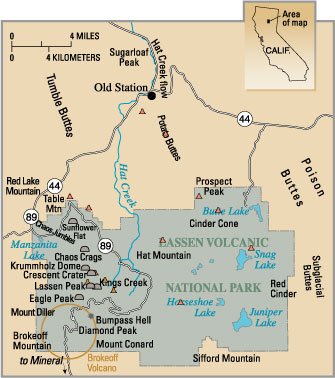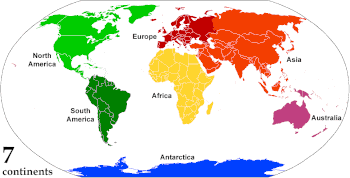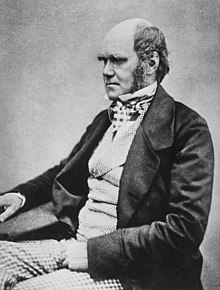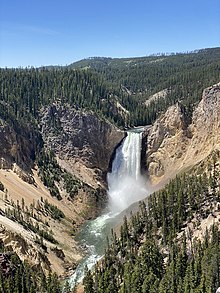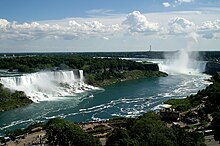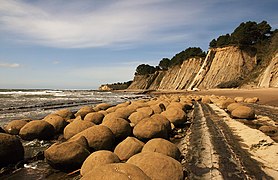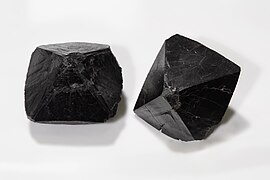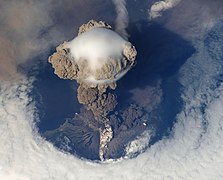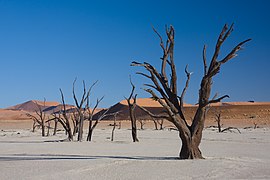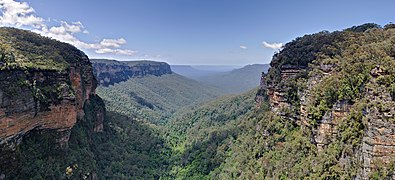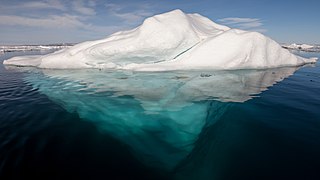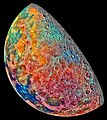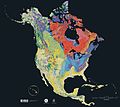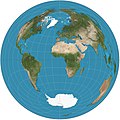
Back Portaal:Geologie Afrikaans بوابة:علم طبقات الأرض Arabic قيسارية:جيولوجيا ARY Πύλη:Γεωλογία Greek Portaal:Maateadus Estonian درگاه:زمینشناسی Persian Portail:Géologie French Portale:Geologia Italian Портал:Геологија Macedonian Portaal:Geologie Dutch
The Geology Portal
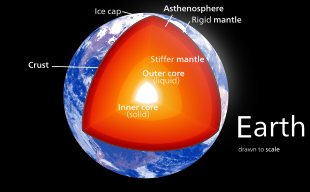
Geology (from Ancient Greek γῆ (gê) 'earth' and λoγία (-logía) 'study of, discourse') is a branch of natural science concerned with the Earth and other astronomical objects, the rocks of which they are composed, and the processes by which they change over time. Modern geology significantly overlaps all other Earth sciences, including hydrology. It is integrated with Earth system science and planetary science.
Geology describes the structure of the Earth on and beneath its surface and the processes that have shaped that structure. Geologists study the mineralogical composition of rocks in order to get insight into their history of formation. Geology determines the relative ages of rocks found at a given location; geochemistry (a branch of geology) determines their absolute ages. By combining various petrological, crystallographic, and paleontological tools, geologists are able to chronicle the geological history of the Earth as a whole. One aspect is to demonstrate the age of the Earth. Geology provides evidence for plate tectonics, the evolutionary history of life, and the Earth's past climates.
Geologists broadly study the properties and processes of Earth and other terrestrial planets. Geologists use a wide variety of methods to understand the Earth's structure and evolution, including fieldwork, rock description, geophysical techniques, chemical analysis, physical experiments, and numerical modelling. In practical terms, geology is important for mineral and hydrocarbon exploration and exploitation, evaluating water resources, understanding natural hazards, remediating environmental problems, and providing insights into past climate change. Geology is a major academic discipline, and it is central to geological engineering and plays an important role in geotechnical engineering. (Full article...)
Recognized content -

A mudpot, or mud pool, is a type of acidic hot spring, or fumarole, with limited water. It usually takes the form of a pool of bubbling mud, as a result of the acid and microorganisms decomposing surrounding rock into clay and mud. (Full article...)
Related portals
Get involved
Ali Mehmet Celâl Şengör (Turkish: [ˈali ˈmehmet ˈdʒeɫal ˈʃænɟœɾ]; born 24 March 1955) is a Turkish geologist. He is retired from the faculty at Istanbul Technical University, Department of Geological Engineering.
Şengör is a (foreign) member of the American Philosophical Society, the United States National Academy of Sciences, the Russian Academy of Sciences and the Serbian Academy of Sciences and Arts. He is a foreign member of the Russian Academy of Science. He is a recipient of Gustav-Steinmann-Medaille — the highest distinction of the Geologische Vereinigung e.V. (Full article...)
Did you know
- ... that geologist Gilbert Wilson was the fifth Wilson at school, so he was known as "Quintus"?
- ... that Frederick Murray Trotter had a distinguished career as a field geologist despite losing a part of his skull and an eye to shrapnel during World War I?
- ... that the Apollo 12 Solar Wind Spectrometer detected a gas-ion shockwave produced by the impact of the Apollo 13 S-IVB stage on the lunar surface?
- ... that the Danish geologist Tove Birkelund received a gold medal for her early work on fossils of Scaphites in Greenland?
- ... that the geology of the Ellsworth Mountains was explored by geologists using motor toboggans in 1961?
- ... that Kenneth Creer supported applying cosmology to geological problems?
- ... that Karen Hanghøj, the 2023 winner of the William Smith Medal for applied geology, became the first female director of the British Geological Survey, 183 years after it was founded?
- ... that the groundwater level of a coastal aquifer system changes with the tide?
Top 10 WikiProject Geology Popular articles of the month
Featured pictures
Main articles
Selected pictures
Associated Wikimedia
The following Wikimedia Foundation sister projects provide more on this subject:
-
Commons
Free media repository -
Wikibooks
Free textbooks and manuals -
Wikidata
Free knowledge base -
Wikinews
Free-content news -
Wikiquote
Collection of quotations -
Wikisource
Free-content library -
Wikiversity
Free learning tools -
Wikivoyage
Free travel guide -
Wiktionary
Dictionary and thesaurus




